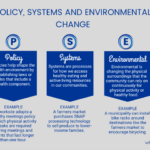
Sep 17, 2020 | Community News, News
ALICIA NEAVES
WLTX COLUMBIA
MAY 21, 2020
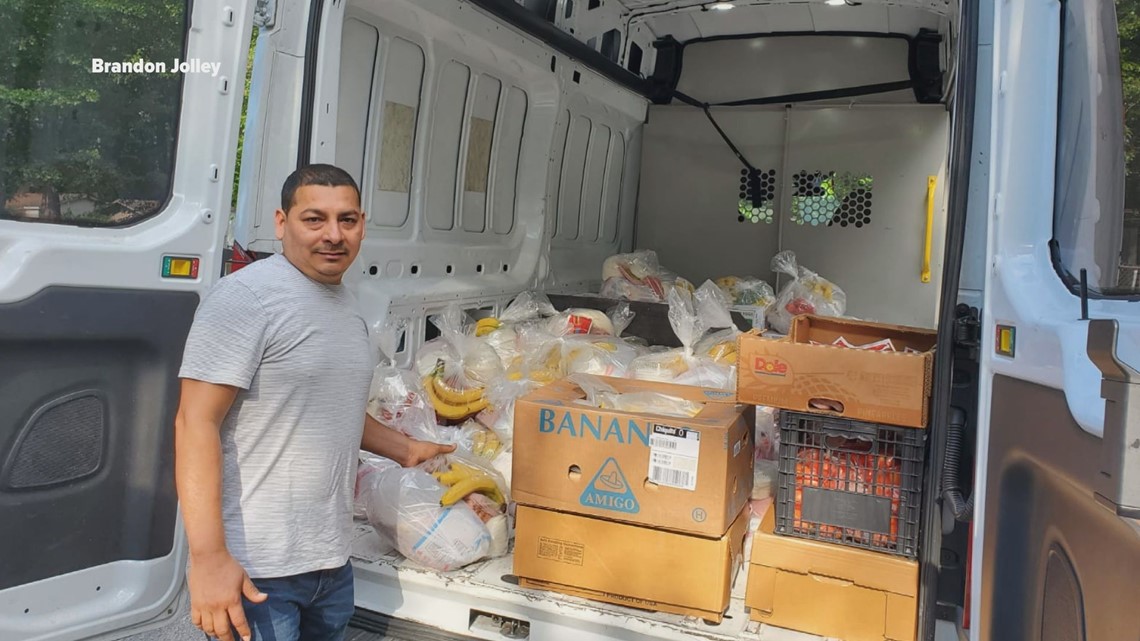
At the start of the pandemic when thousands of South Carolinians became jobless overnight, Mutual Aid was born.
“In lower-income communities, mutual aid happens all the time but it’s not normalized. Neighbors are always helping each other, and we’re just expanding that spirit,” said volunteer, Carla Damron.
Mutual Aid is a volunteer-based organization in Columbia with about 70 members.
“The Mutual Aid way is that we’re not really asking questions,” said volunteer, Dylan Gunnels. “We just know that you need help.”
Midlands residents in need of necessities, masks, toys and games for kids, or just a person to talk to can contact volunteers to ask for help. Volunteers can be reached through the Mutual Aid website, Facebook page, or a bilingual telephone hotline (888-927-6679).
“No questions asked,” said volunteer, Omme-Salma Rahemtullah. “You need your light bill paid? We’re gonna figure out how to get together some money.”
Once volunteers receive a request, the Mutual Aid network springs into action.
“Here’s the need. Who can respond?” said volunteer, Deborah Billings, who helped start Mutual Aid. “We’ve had responses that range from, ‘Hey, I’ll call Instacart and make the order’, and five people will pitch in $20 each and we get that grocery bill covered.”
The organization doesn’t just wait on requests. They brainstorm on a weekly basis about other needs in the community, like a gift card drive and an e-drive to meet electronic and internet access needs.
“We’re currently doing an e-drive to request if people have electronics they’re not using to donate to us,” said Rahemtullah. “Someone just actually sent me one in the mail. It’s a tablet.”
For local seniors who need a ride to the store, Mutual Aid volunteers can help.
A representative from the state’s Department of Juvenile Justice (DJJ) also reached out to Mutual Aid in efforts to get masks for employees and the youth at the facility. Volunteers got to work immediately to fill that need.
“There was a call out from the Lutheran Services, who works with adults with developmental delays, that they needed activities for adults to do,” said Rahemtullah. “We put it out on Facebook, this woman saw it…and she dropped off 10 big garbage bags full of yarn.”
In some cases when supplies were low to make masks, volunteers reach out to their network of friends who help fill the gap.
“I’m really amazed at how people are willing to contribute,” said Damron. “Even if you just call friends and say, ‘We have a family that hasn’t had groceries in two weeks, can you help?’ and they’re saying, ‘Sure!'”
Aside from volunteers helping financially, . The Sabor Latino initiative is coordinated by Mutual Aid volunteer, Nelly Jolley.
Billings says Mutual Aid connected with Eat Smart Move More, and after a written proposal about Sabor Latino, the organization received a $3,000 grant to help fund the initiative. She says $25 a week can feed a family of four.
“Now in the time of this pandemic, certain resources like unemployment benefits, like the CARES Act, they are not accessible to these community members,” said Billings of the Midlands Latino community. “How do they pay for their rent? How do they pay for their food? It becomes really a critical, critical issue.”
The organization isn’t limited to donation drives or grocery delivery. They try and meet any need, such as helping in the fight for tenants who can’t pay rent due to the pandemic. Gunnels started the petition to push this conversation with state and local leaders.
“Maybe there’s the possibility of working out long-term payment plans for short-term missed payments because of the COVID situation,” said Gunnels.
If you’d like to volunteer or if you’re in need of assistance, call the Mutual Aid hotline at 888-927-6679 or visit mutualaidmidlands.org.
“We’re all feeling powerless right now facing this virus, but this is a little thing we can do to help our neighbors,” said Damron. “Everyone has something to offer.”
“I really feel like this is what we’re called to do,” said Gunnels. “I feel like we are called to love our neighbor, we are called to serve our neighbor.”
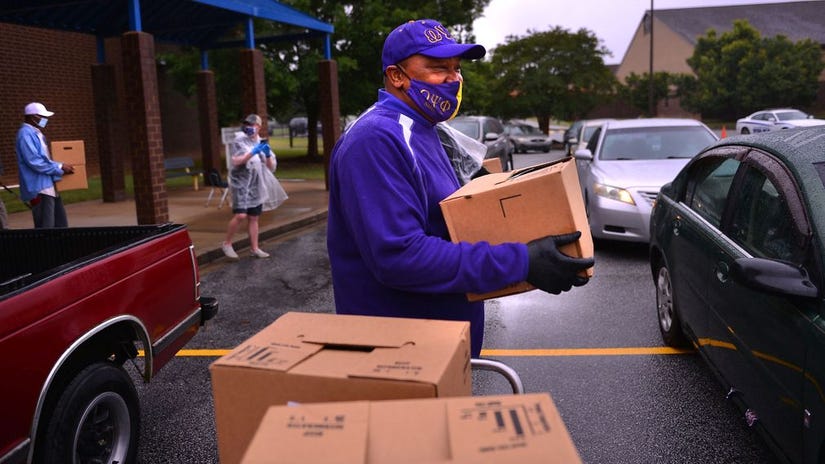
Sep 17, 2020 | Community News, News
GENNA CONTINO
SPARTANBURG HERALD-JOURNAL
JUNE 16, 2020

TIM KIMZEY/SPARTANBURG HERALD-JOURNAL
Tuesday afternoon, cars filled with Spartanburg residents wrapped around Mary H. Wright Elementary School to pick up boxes of produce. Volunteers dropped off boxes filled with tomatoes, onions, sweet potatoes, lettuce, corn and more in the back seats of cars while people yelled “thank yous” and children waved.
The produce giveaway was organized by Rep. Rosalyn Henderson-Myers (D-Spartanburg), Eat Smart Move More South Carolina and Healthy People, Healthy Carolinas. Volunteers joined Henderson-Myers and event organizers to hand out boxes and bags of produce and vouchers for $10 at the Hub City Farmers’ Market.
“COVID-19 and people being out of work or having to work reduced hours and families not being able to have money to feed themselves,” was Henderson-Myers’ inspiration for the event, she said.
In Spartanburg County, about 93,000 people live in a food desert or an area where people have limited access to healthy and affordable food, according to South Carolina DHEC’s food desert map. More than 8,000 of those live along South Church Street near Mary H. Wright
Elementary School.
The pandemic has made it even harder for those living in food deserts to find healthy food to eat, said Alissa Duncan, Spartanburg food systems coordinator for Partners for Active Living.
South Carolina’s food desert map
“It exacerbates the problem,” Duncan said about COVID-19. “A food desert is a characteristic of low income and low access combined.”
Last year, a Save-A-Lot supermarket went out of business in the area, leaving those who live around that area of South Church Street without an easily accessible grocery store. There have been discussions about a new grocery store opening in the area, Henderson-Myers said,
but she hasn’t heard of any recent progress.
Though there were 200 boxes and 50 bags available, the cars kept coming, wrapping all the way around the school, down Marion Avenue and onto South Church Street.
“Only one per car, I’m sorry,” volunteers said to those with two or three families in their cars. Mattie Sarter drove with her friend, Amy Fuller, to pick up produce, but they were only able to get one box.
“I got five in my family,” Sarter said, unable to share the produce with Fuller. Fuller lives near South Church Street and Sarter normally picks her up to take her to the grocery store. Henderson-Myers said she hopes to host more events like this in the future to help her
community.
“The overall impact is that people will get some healthy foods and they’ll be able to feed their families, at least for the few meals that they’ll provide,” Henderson-Myers said.
Read the full article and see pictures from the event.
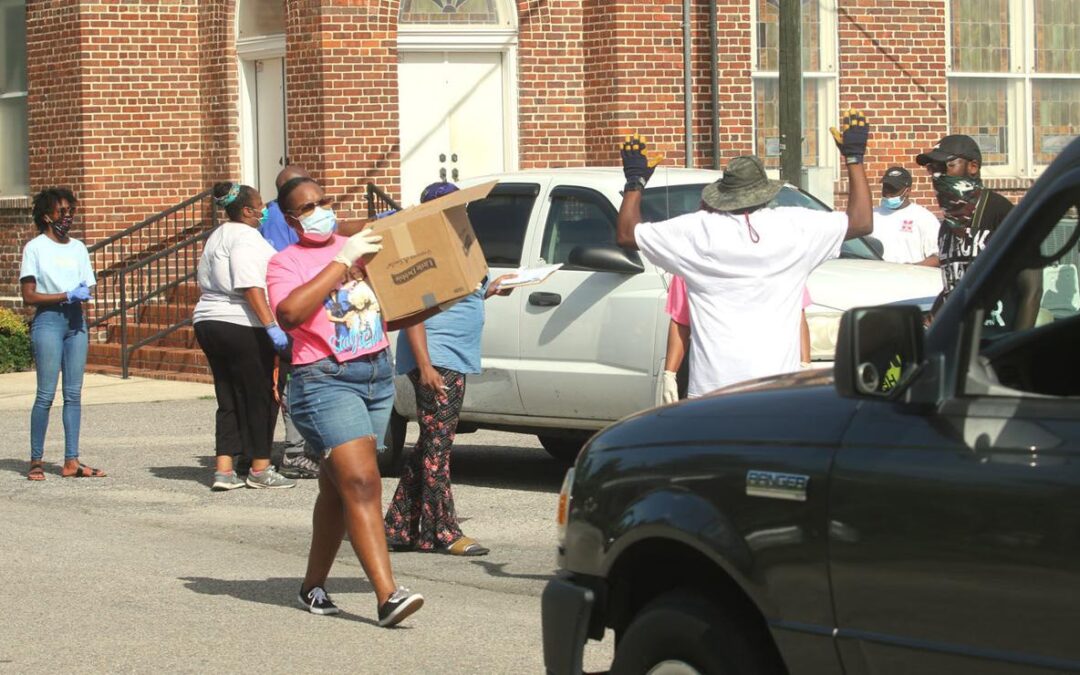
Sep 17, 2020 | Community News, News
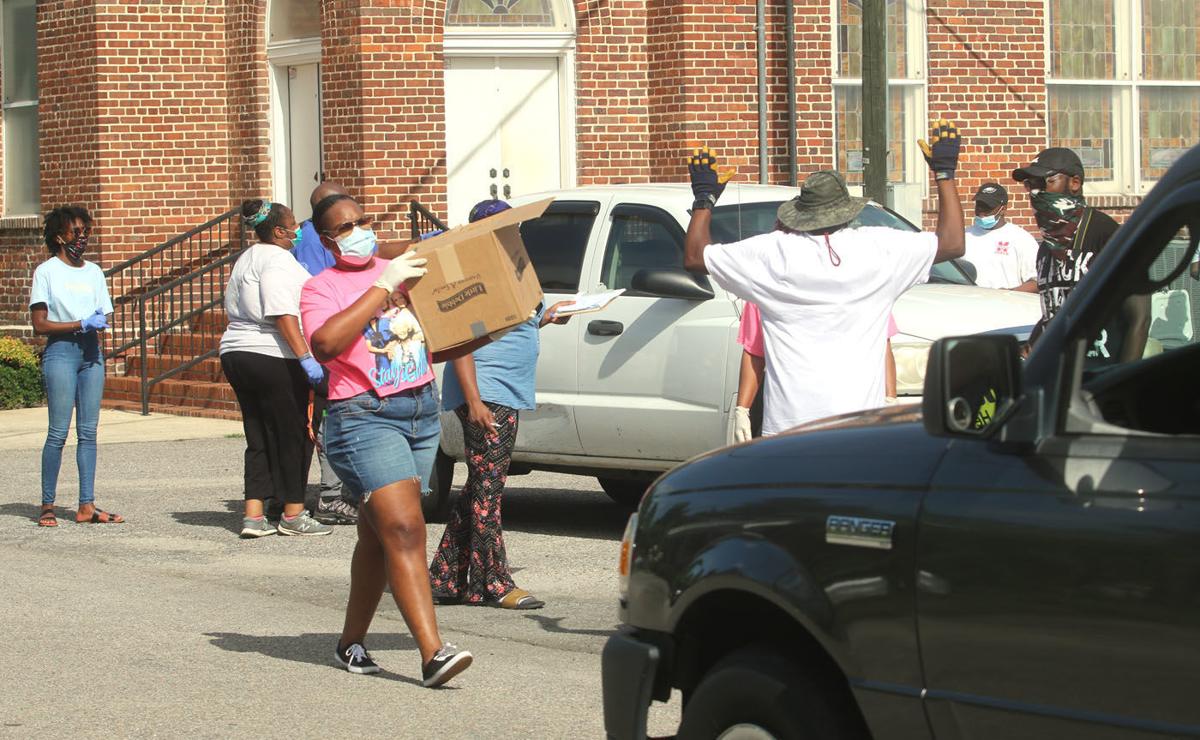
STAR & ENTERPRISE/NAEEM MCFADDEN
Mullins, South Carolina is located within a low-income area of Florence County where the poverty rate hovers around 40% — nearly 7,000 residents. The USDA classifies Mullins as a food desert, which means many families were already lacking access to fresh, healthy, and affordable foods, but COVID-19 made the situation worse.
Marcus Howard, the founder of the Pee Dee Mobile Farmer’s Market (PDMFM), heard about the Rapid Response Grant opportunity and applied for a mini-grant. Within days of applying, he received good news. His food distribution project got funded.
The PDMFM organized a one-day food distribution event targeting seniors, African Americans, single mothers, children, and frontline workers who were struggling to pay for healthy food. Howard leveraged his partnerships with Harvest Hope Food Bank and the Pick 42 Foundation, Inc. to pay for fresh produce to feed families.
“We had about 300 boxes and we had some extra food that we gave out,” Howard said. “The goal is to make sure that we get our folks access to healthy foods. The goal is to go to different communities in Florence, Mullins, Dillon, Cheraw and Bennettsville to help them make the healthy choice the easiest choice.”
Howard said he plans to continue more distributions. To get involved with the Pee Dee Mobile Farmer’s Market or for more information, email peedeemfm@gmail.com.
Read the Star & Enterprise article.
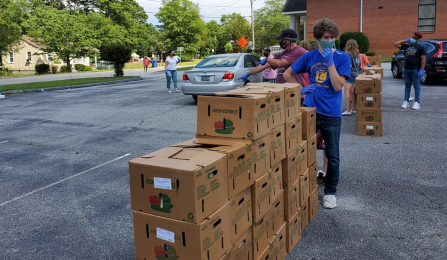
Sep 17, 2020 | Community News, News
In Columbia, the zip code 29203 is well-known for health disparities and inequities of all kinds. That’s why many public health and health care organizations often focus their community health improvement efforts on this community. The National Action Network (NAN) of Columbia knew the realities of this community and provided a Juneteenth food distribution kickoff event, partially funded by Eat Smart Move More South Carolina, to help fill the need for food in this food desert.
food in this food desert.
NAN Columbia partnered with Reid Chapel AME Church, Harvest Hope Food Bank, Dianne’s Call, Emmaus Church, North Columbia Youth Empowerment Zone, and Every Black Girl to help promote the food distribution and leverage food supplies. They recruited 40 volunteers to help organize and handout food boxes.
“We impacted 200 families with produce for two weeks with another anticipated 200 within the next two weeks,” said Tiffany James, NAN Columbia president.
NAN Columbia is a chapter of the national civil rights non-profit lead by Reverend Al Sharpton, which promotes a modern civil rights agenda that includes the fight for one standard of justice, decency, and equal opportunities for all people. To learn more about NAN Columbia, visit their Facebook page.
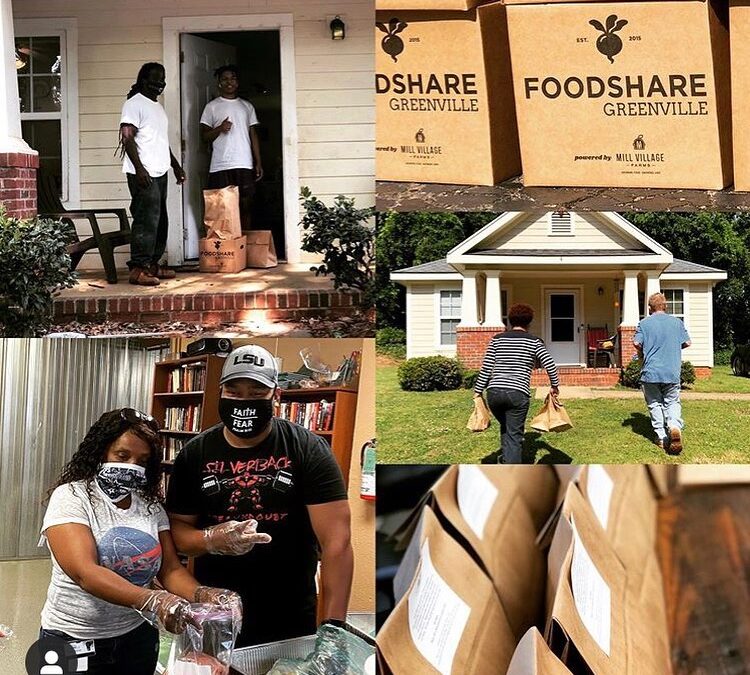
Sep 17, 2020 | Community News, News
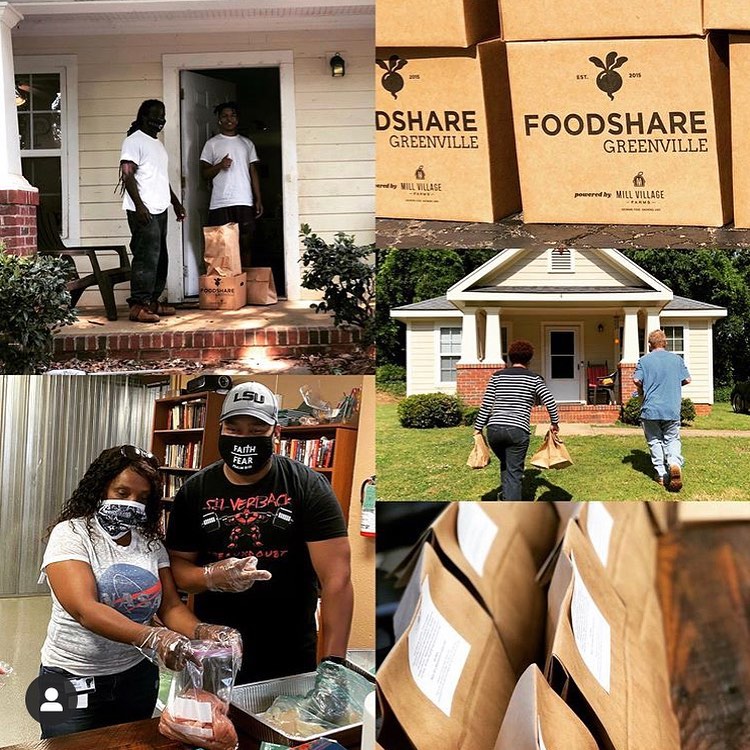 Believe it or not, food deserts do exist in urban areas. Why? Because all neighborhoods in cities are not equal. Grocery stores don’t want to put down roots in low-income neighborhoods because they fear they won’t be successful. In Greenville, Mill Village Farms is changing that landscape and stepping up their efforts to make sure residents get fresh, locally grown produce during the coronavirus pandemic.
Believe it or not, food deserts do exist in urban areas. Why? Because all neighborhoods in cities are not equal. Grocery stores don’t want to put down roots in low-income neighborhoods because they fear they won’t be successful. In Greenville, Mill Village Farms is changing that landscape and stepping up their efforts to make sure residents get fresh, locally grown produce during the coronavirus pandemic.
“With the Eat Smart Move More Rapid Response Mini-Grant funding, we were able to purchase the produce for 300 FoodShare boxes. Each box contains enough produce for a family of four for about two weeks,” said Dan Weidenbenner, executive director at Mill Village Farms.
They partnered with 24 partner sites in priority locations throughout Greenville County and their drive-thru site at the United Way of Greenville County to distribute an average of 1,300 FoodShare boxes in the month of May to SNAP participants and those who self-identified as in need. In addition, they gained at least 20 new partner agencies (churches and community organizations) throughout Greenville County who are interested in partnering to distribute FoodShare boxes in the community.
“Since receiving the Eat Smart Move More Rapid Response Mini-Grant, we have raised an additional $100,000 through a virtual culinary concert fundraiser and have partnered with produce suppliers to distribute 500 additional fresh produce boxes per week through the USDA Farmer to Families Food Box Program,” said Weidenbenner.
Mill Village Farms transforms vacant properties into bountiful gardens to grow locally sourced produce for communities that often have limited access to fresh and local foods. Their goal is to empower youth with experiences in basic job skills, sustainable agriculture, and entrepreneurship. The produce grown in their gardens is shared with youth and residents and used in FoodShare boxes. For more information, visit the Mill Village Farms website.
FoodShare South Carolina is a nonprofit organization whose mission is to ensure access to fresh produce for everyone in all communities. They want to enhance the quality of life by creating access to fresh affordable food, quality cooking and skills education. There are five locations around the state: Columbia, Greenville, Orangeburg, Spartanburg, and Lee County. For more information about FoodShare South Carolina and their locations, visit their website.
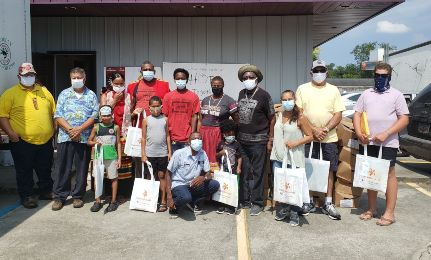
Sep 17, 2020 | Community News, News
 Imagine living in a large, rural area that only has one grocery store. Add COVID-19, social distancing, school closings, and increased unemployment to that scenario. Do you think you would have a tough time finding food to feed your family? About 24,000 people in western Orangeburg County did, and they continue to struggle to find healthy food.
Imagine living in a large, rural area that only has one grocery store. Add COVID-19, social distancing, school closings, and increased unemployment to that scenario. Do you think you would have a tough time finding food to feed your family? About 24,000 people in western Orangeburg County did, and they continue to struggle to find healthy food.
The Pine Hill Indian Community Development Initiative (PHICDI) stepped in to provide healthy food to more than just their American Indian population. They help all families in need, and they continue to do that to this day. Eat Smart Move More South Carolina awarded PHICDI a mini-grant for food distribution supplies that supplemented their existing food distribution events.
“Our ongoing COVID-19 emergency food distribution began May 8 on alternating weeks through September 4th. Each food distribution reached approximately 300 people,” said Michelle Mitchum, Chief of Pine Hill Indian Tribe.
Funds were used to purchase bags for the food distributions and assembly equipment to increase the efficiency of distribution preparations. Existing partners and community volunteers assisted with event preparation and food distributions.
PHICDI’s mission is to rejuvenate western Orangeburg county through developing programs that create and balance food security, access to healthcare, educational success, create jobs, preserve history, and celebrate the rich heritage represented in the area. To learn more about the Pine Hill Indian Community Development Initiative, visit their website or Facebook page.








 Believe it or not, food deserts do exist in urban areas. Why? Because all neighborhoods in cities are not equal. Grocery stores don’t want to put down roots in low-income neighborhoods because they fear they won’t be successful. In Greenville, Mill Village Farms is changing that landscape and stepping up their efforts to make sure residents get fresh, locally grown produce during the coronavirus pandemic.
Believe it or not, food deserts do exist in urban areas. Why? Because all neighborhoods in cities are not equal. Grocery stores don’t want to put down roots in low-income neighborhoods because they fear they won’t be successful. In Greenville, Mill Village Farms is changing that landscape and stepping up their efforts to make sure residents get fresh, locally grown produce during the coronavirus pandemic.


